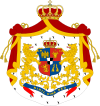
Back الممالك المتحدة Arabic Principáu de Rumanía AST Аб’яднанае княства Валахіі і Малдовы Byelorussian Обединено княжество Влашко и Молдова Bulgarian Principat de Romania Catalan Spojená knížectví Czech Fürstentum Rumänien German Unuiĝintaj Princlandoj Esperanto Principado de Rumania Spanish Ühendatud vürstiriigid Estonian
United Principalities of Moldavia and Wallachia (1859–1862) Romanian United Principalities (1862–1866) Romania (1866–1881) Principatele Unite ale Moldovei și Țării Românești (Romanian) | |||||||||||||||
|---|---|---|---|---|---|---|---|---|---|---|---|---|---|---|---|
| 1859–1881 | |||||||||||||||
Motto:
| |||||||||||||||
Anthem:
| |||||||||||||||
 The United Principalities (Romania) 1859–1878, shown in light yellow | |||||||||||||||
| Status | Vassal state of the Ottoman Empire (1859–1877)[a] | ||||||||||||||
| Capital | |||||||||||||||
| Common languages | |||||||||||||||
| Religion | Romanian Orthodox, Catholicism, Judaism, Reformed Church | ||||||||||||||
| Demonym(s) | Romanian | ||||||||||||||
| Government | Constitutional monarchy[b] | ||||||||||||||
| Domnitor (Prince) | |||||||||||||||
• 1859–1866 | Alexandru Ioan Cuza | ||||||||||||||
• 1866–1881 | Carol I | ||||||||||||||
| Regency | |||||||||||||||
• 1866 | Lascăr Catargiu | ||||||||||||||
• 1866 | Nicolae Golescu | ||||||||||||||
• 1866 | Nicolae Haralambie | ||||||||||||||
| President of the Council of Ministers | |||||||||||||||
• 1862 | Barbu Catargiu (first) | ||||||||||||||
• 1879–1881 | Ion Brătianu (last) | ||||||||||||||
| Legislature | Parliament | ||||||||||||||
| Senate | |||||||||||||||
| Assembly of Deputies | |||||||||||||||
| History | |||||||||||||||
| 24 January 1859 | |||||||||||||||
• First common government | 22 January 1862 | ||||||||||||||
• First Constitution | 13 July 1866 | ||||||||||||||
| 9 May 1877 | |||||||||||||||
• Kingdom established | 14 March 1881 | ||||||||||||||
| Area | |||||||||||||||
| 1860[1] | 123,335 km2 (47,620 sq mi) | ||||||||||||||
| 1881[1] | 130,177 km2 (50,262 sq mi) | ||||||||||||||
| Population | |||||||||||||||
• 1860[1] | 3,917,541 | ||||||||||||||
• 1881[1] | 4,545,821 | ||||||||||||||
| Currency | |||||||||||||||
| |||||||||||||||
| Today part of | |||||||||||||||
| |||||||||||||||
The United Principalities of Moldavia and Wallachia (Romanian: Principatele Unite ale Moldovei și Țării Românești),[2] commonly called United Principalities or Wallachia and Moldavia, was the personal union of the Principality of Moldavia and the Principality of Wallachia. The union was formed 5 February [O.S. 24 January] 1859 when Alexandru Ioan Cuza was elected as the Domnitor (Ruling Prince) of both principalities. Their separate autonomous vassalage in the Ottoman Empire continued with the unification of both principalities. On 3 February [O.S. 22 January] 1862, Moldavia and Wallachia formally united to create the Romanian United Principalities, the core of the Romanian nation state.[3][4]
In February 1866, Prince Cuza was forced to abdicate and go into exile by a political coalition led by the Liberals; the German Prince Karl of Hohenzollern-Sigmaringen was offered the Throne and, on 22 May [O.S. 10 May] 1866 he entered Bucharest for the first time. In July the same year, a new constitution came into effect, giving the country the name of Romania; internationally, this name was used only after 1877, since at the time the foreign policy of the state was drafted by the Ottomans. Nominally, the new state remained a vassal of the Ottoman Empire. However, by this time the suzerainty of the Sublime Porte had become a legal fiction. Romania had its own flag and anthem; after 1867, it had its own currency as well.
On 21 May [O.S. 9 May] 1877, Romania proclaimed itself fully independent; the proclamation was sanctioned by the Domnitor the following day. Four years later, the 1866 constitution was modified and Romania became a kingdom, on 22 May [O.S. 10 May] 1881, Domnitor Carol I was crowned as the first King of Romania. After the First World War, Transylvania and other territories were also included.
For its triple symbolic meaning, the date of May 10 was celebrated as Romania's National Day until 1948, when the Communist regime installed the republic on 30 December 1947.
- ^ a b c d Anuarul Statistic al României 1937 si 1938 [Romanian Statistical Yearbook]. Bucharest: INSSE. 1939. p. 41.
- ^ Metzeltin, Michael (2006). "Nume ale României: o istorie complexă" [Names of Romania: a complex history] (PDF). In Institutul de Filologie Română „A. Philippide” (ed.). Identitatea culturală romanească în contextul integrării europene [Romanian cultural identity in the context of European integration] (in Romanian). Editura Alfa Iași. pp. 207–223. ISBN 9789738953215. Archived from the original (PDF) on 11 April 2021. Retrieved 11 April 2021.
- ^ (in French) Histoire du congrès de Paris, Edouard Gourdon (1857)
- ^ Boia, Lucian (2001). Romania: Borderland of Europe. Reaktion Books. ISBN 9781861891037.
© MMXXIII Rich X Search. We shall prevail. All rights reserved. Rich X Search


